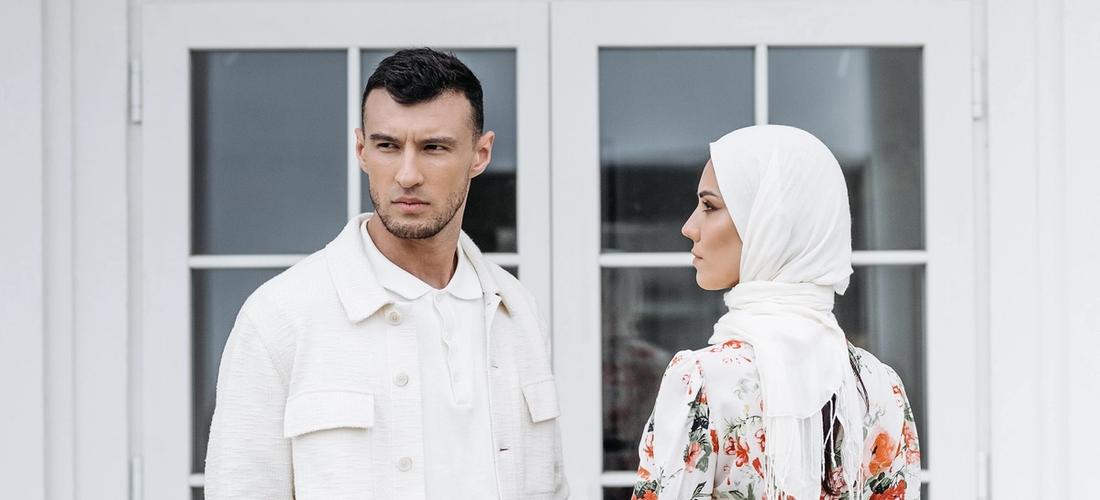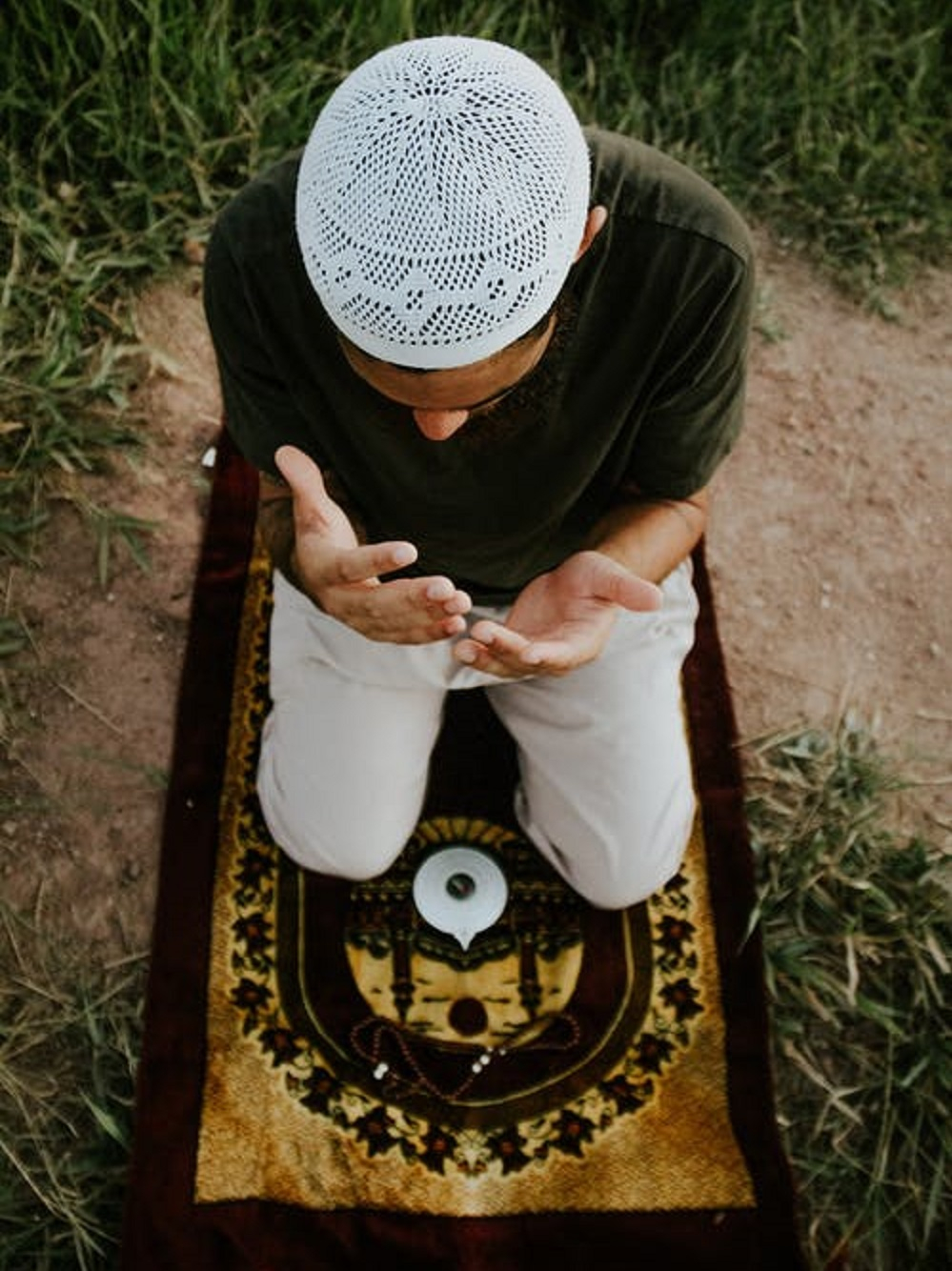6 Words of Advice for Convert Muslim Women Married to "Born Again" Muslim Men
Faith
|
Feb 8, 2022
|
8 MIN READ

Image source: Pavel Danilyuk from Pexels
By Laura El Alam
Over the past two decades, I have spoken with many fellow converts who were introduced to Islam by their husbands. Listening to their stories, I began to notice a pattern. The majority of these women met their husband at a time when he was not practicing his deen.
He was initially a Boyfriend – a charming, handsome (probably) immigrant, whose Muslim-ness was intriguing (or even seemingly “exotic”) but not very apparent in his actions.
The Muslim Boyfriend usually blended into the society around him, often going to the same bars, concerts and movies as his friends and colleagues, mixing casually with females, sometimes even changing or shortening his name to “Mo” or “Sam” so that his accent and avoidance of bacon were really the only things that set him apart from other Americans.
In some ways he barely seemed different from the other guys she had dated, but there was something unique about him.
He displayed many admirable qualities, like kindness to elders, warm hospitality and generosity. He clearly revered his faith, even though he wasn’t practicing it properly or barely at all. She could tell he sometimes grappled with guilt about his lifestyle, knowing much of it was at odds with his upbringing. She found this heartwarming.
You see, after those Boyfriends became Husbands, they often became Fathers. And somewhere along the journey of manhood, fatherhood and increased maturity, many of those men had a religious breakthrough.
In addition, Muslim Boyfriend spoke about marriage much sooner than other men she had dated. Clearly – unlike so many commitment-phobes she’d met – he intended to tie the knot in the near future, rather than “date” her perpetually.
For many women, Muslim Boyfriend became Muslim Husband, and the two formed a union that was passionate but destined to be complicated by the merging of two different cultures. It often ended up being even MORE complicated due to the husband’s eventual religious awakening.
You see, after those Boyfriends became Husbands, they often became Fathers. And somewhere along the journey of manhood, fatherhood and increased maturity, many of those men had a religious breakthrough.
After years of not practicing or learning about their deen, at some point the Muslim Husband had a watershed moment and re-embraced his belief. Suddenly he started going to the masjid regularly. He gave up drinking, free mixing, inappropriate songs and movies and replaced those with Islamic lectures, new friends whom they called “brother” and long moments of prostration on the newly-laid-out prayer rug on the living room floor.
He grew out his beard and threw out their short shorts. He often demonstrated the unmistakable combination of zeal and self-righteousness of the newly-minted Muslim.
As he re-discovered his faith, he naturally desired to make major life changes. He wanted to raise his children as proper Muslims. He craved an Islamic environment in their home. All of this was in many ways positive spiritual progress for the Husband, but it caught his non-Muslim wife by surprise.

Image source: Pexels
Suddenly her husband – now calling himself by his full Islamic name – had a whole new lifestyle along with a new set of rules. He started disappearing for long chunks of time – and practically the whole month of Ramadan – so that he could pray in the mosque, which he now called "the masjid."
All of a sudden it wasn’t enough that he stopped drinking alcohol – he wanted her to stop drinking, too! And to dress more modestly!! And to learn about Islam so that she could help him to raise their children as Muslims!? The word “haram,” which he had never uttered in the early days of their marriage, became a constant mantra.
He didn’t even want her or their children to attend her family’s annual Christmas party anymore.
“But you’ve always celebrated Christmas,” she would protest, confused and frustrated. “We met through our office Secret Santa exchange! I picked the name ‘Mo’ out of the hat. Remember when you were Mo?!”
Caught up in his progress and energized by the new, improved version of himself, the Born Again Muslim Husband sometimes had very little sympathy for his wife’s frustrations and concerns. He knew he was on the right path and thought that she should be grateful for his spiritual growth. He often felt impatient for her to get on the path with him, since Islam is clearly the answer and would make her a better person, too.
But she never signed up for that. She married Muslim Boyfriend. Guidance comes only from Allah (S) and cannot be rushed or forced.
Standing Up For Your Own Muslim Experience
The amazing thing, in my opinion, is that so many non-Muslim wives “stood by their man” steadfastly in the face of drastic changes and a great deal of self-sacrifice. They married one man and ended up with a completely different one, but summoned up enough love and loyalty to adapt, change and support him through it all.

Even more amazing: By the grace of Allah (S), many of those women ended up embracing Islam. Others might say those women became Muslim because of their husbands. I would actually say it happened because of Allah (S) and DESPITE their husbands.
If you are a woman who has recently converted to Islam, and if the above scenario sounds familiar at all – even if your husband is a practicing and knowledgeable Muslim – I have some six pieces of advice to help you own and navigate your own Muslim experiences.
1. Don’t lose your identity. If your husband is from a Muslim-majority country and is your primary teacher about Islam, he might inadvertently present his cultural background as “the way” to practice Islam. However, no culture has a monopoly on Islam. People can practice Islam fully while still cherishing and preserving certain things about themselves and their traditions, as long as those things don’t contradict the deen.
For example, if you are an American woman who tends to dress in understated, casual clothes, do not think that you have to force yourself into a magenta and gold salwar kameez made for a Pakistani woman. You can find clothes in your favorite colors, styles and textures that are still modest. You can still cook the foods you grew up with, as long as the ingredients are halal. Eventually you will find a happy balance between honoring your unique personality and practicing Islam. Be patient and kind to yourself, as forming your own Islamic identity takes a long time.
2. Make sure your husband is NOT your only font of knowledge about Islam. If you are a brand new Muslim, you should find a female mentor who is experienced, knowledgeable and wise. Your local masjid (mosque) might be able to pair you up with a good candidate. Some mosques even have a well-organized mentoring network, as well as classes for new converts. There are likely many Islamic topics that your husband – as much as he may have learned – will not understand fully.
There are also rules and guidelines specific to women that many men are unaware of. Furthermore, It is important to hear other points of view and to learn Islam from various sources. Even Muslims with the best of intentions sometimes teach their culture as fact or misunderstand some points of their deen. A new Muslim will not always be able to distinguish fact from fiction, so make sure to read and learn as much as you can.
3. If something is important to you – in your marriage, in your household, in the upbringing of your children or anything else – make it known! Submitting to Allah (S) does not mean forsaking all of your desires, opinions and goals (unless they go against Islamic rules). I recently saw a YouTube video about a convert to Islam whose husband, just like the men described above, was her non-practicing Muslim Boyfriend for quite a while.

Image source: Pexels
He suddenly decided they should legalize their relationship and get married. She simultaneously decided to embrace Islam. Of course, it is positive that the couple ended up in a halal relationship, but in her eagerness to please, the convert unnecessarily sacrificed so much. She ended up getting married in a spontaneous Islamic marriage ceremony conducted in Turkish (a language she did not understand). She had no family or friends present. At the last minute, she borrowed a modest (but not lovely, or well-fitted) dress that she didn’t even like.
Women should not have to compromise things that are very important to them because they are afraid to ask their husbands, or afraid to be “too needy.” Marriage is a two-way street where both spouses should seek to make each other happy and comfortable.
4. Your husband is not Allah (S). That is obvious, right? But believe it or not, sometimes the line gets subconsciously blurred. When he is the object of your love as well as your main Islamic role model, a husband might attain a status in your mind and heart that only The Lord of the Universe deserves. As a result, some women place so much trust in their husbands that when those men make mistakes (as humans do), the women lose faith in Islam.
And sometimes women are so eager to please their husband, they are willing to do things that are un-Islamic, or refrain from asking for their Islamic rights just to make him happy. Respect your husband. Love your husband. But worship only Allah (S), and make sure your belief is based on His perfection, for only He (S) will never let you down.
5. Find practicing Muslim sisters and join a study group. Your Islamic belief and knowledge must be nurtured. Meeting with sincere, practicing, knowledgable sisters to learn about Islam – and to have halal fun – is a wonderful way to grow as a Muslim and develop crucial bonds of sisterhood and friendship.
6. Know your rights and responsibilities as a Muslim woman. Many women convert to Islam because they are impressed by the dignity and respect that the faith bestows upon women. Islam gave women rights thousands of years before Western countries even considered women’s rights worth debating. If you are married to a Muslim man, you should be able to count on him to fulfill his responsibilities of caring and providing for you and your children.
Respect your husband. Love your husband. But worship only Allah (S), and make sure your belief is based on His perfection, for only He (S) will never let you down.
You should never feel guilty for demanding ALL the rights as given to you by your Creator. Additionally, in order to please Allah (S), you must also know and fulfill your obligations to your husband and everyone else. There are countless articles and lectures that have excellent information on Muslims’ duties and rights.
If your husband has introduced you to Islam, whether by clear and gentle guidance or by a more confusing and circuitous route, know that, in the end, we are all in charge of our own souls. The way we choose to live our life on earth and our fate after death depend on our choices. True belief is sincere and voluntary. It cannot and should not be forced. If we remember to look to the essence of Islam and all its beauty instead of the inherent imperfection of humans, we will understand that it invites us to a wholesome life and peaceful submission to God.
Sometimes God beckons us to Him through unexpected ways. If He (S) has guided you to His (S) worship through marriage to a Muslim man, know that your unique path was designed by the Best Planner (S). He has seen – and Insha’Allah will reward – your loyalty, perseverance and sacrifice.
Laura El Alam is a prolific author who has been contributing to various publications since 2009. She is the founder of Sea Glass Writing & Editing, where she provides a wide variety of content writing and editing services. She also runs The Common Sense Convert on Instagram and Facebook, where she aims to support and educate female converts to Islam.
Subscribe to be the first to know about new product releases, styling ideas and more.
What products are you interested in?

